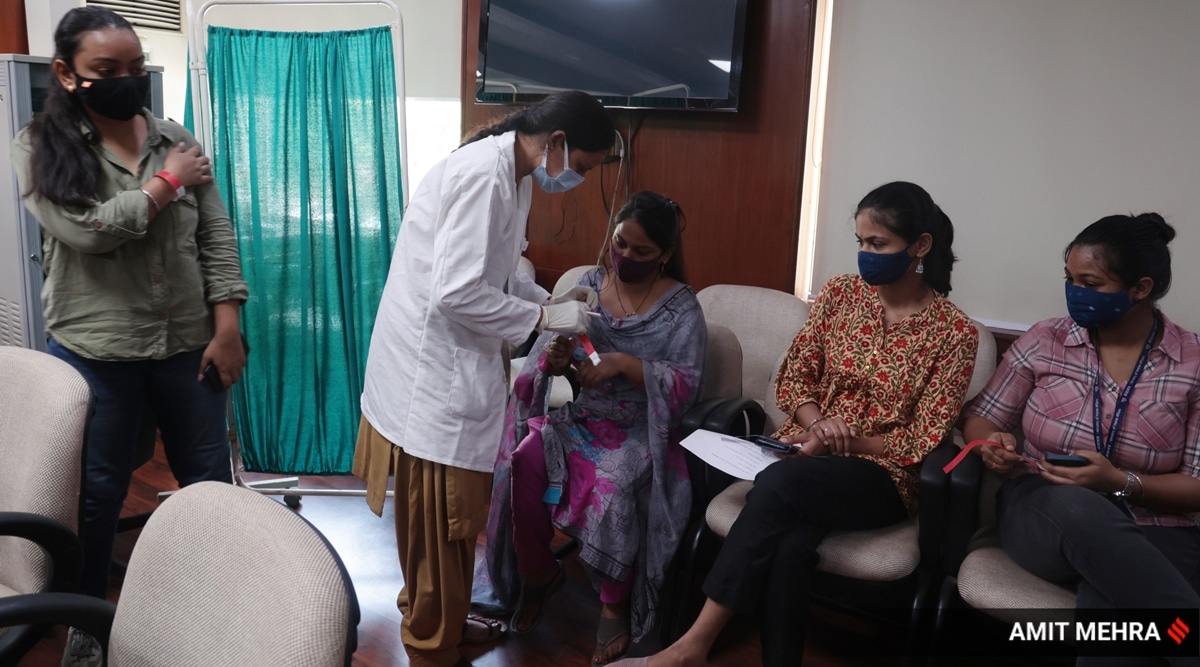 An official order regarding the lifting of masks is yet to come. (Express file photo by Amit Mehra)
An official order regarding the lifting of masks is yet to come. (Express file photo by Amit Mehra)Although Covid cases and deaths have seen a slump as compared to the second wave, according to government data from the last six months, there has been an uptick in Covid deaths, cases and hospitalisations in August this year. A total of 158 Covid deaths were recorded, and the primary reason for 70 of these was Covid.
However, the data shows that the first half of September saw 30 Covid deaths, of which 20 deaths can be attributed to Covid as the primary reason. Between March and September, deaths were the lowest in March, after which the Delhi Disaster Management Authority lifted the mask mandate in public places. The fines were reinstated within three weeks after a sharp rise in cases in May ahead of the festive season.
At the DDMA’s 37th Covid review meeting Thursday, it deliberated lifting Rs 500 fine for not wearing masks in public places from October 1 as the capital has been seeing a steady dip in cases. It has also decided to bring down the staff deployed, and equipment and beds earmarked for Covid patients in a phased manner.
Officials said, “Covid cases have dropped drastically in Delhi and the situation is better than earlier. Keeping all this in view, it has been decided to lift mask fines and scale down resources and facilities like ICU, oxygen beds and ventilators as most of them are lying unused. However, considering the risks that come with the festive season, awareness campaigns on Covid appropriate behaviour in public places and the importance of wearing masks will be organised to keep the virus under control.”
Experts and senior doctors, however, have mixed reviews on the scrapping of fines. Some opined that lifting fines will not have a major impact on cases while some are apprehensive and said that the mandate can stay for another month or two as festive and pollution seasons are around the corner.
“In the festive season, the government should focus on surveillance and continue to observe Covid appropriate behaviour so that the infection remains low. Overcrowding in markets, transport and public functions are potential risks that facilitate the transmission of the virus. Such a decision could have been delayed for another 1-2 months,” said Dr Jugal Kishore, Director Professor and Head of Community Medicine Department at Safdarjung Hospital.
Dr Manoj Goel, director, pulmonology, Fortis memorial research institute, said that the mask mandate can be removed soon as things are fast returning to normalcy. However, he stressed that wearing masks is important to prevent other viral and communicable respiratory infections.
“Masks also prevent risks of pollution. As the monsoon still continues and the festive season is also about to start, there may be overcrowding and more pollution, leading to an increased risk of respiratory infections, asthma and obstructive airway diseases. Thus, it is advisable to continue to wear masks, especially in public places and workplaces, for our own safety,” said Goel.
“Mask fines may go, but people will still be advised to wear them in public places. Awareness campaigns will be conducted in this regard,” he added.
An official order regarding the lifting of masks is yet to come.
The government data shows that 9,270 beds are reserved for Covid, of which only 44 are occupied, 40 of 8,709 oxygen beds are occupied, and only 19 of 2,124 Covid ICU beds are occupied. There are 1,197 ventilator beds reserved for Covid patients and only 10 of them are occupied.
Following this, the DDMA also decided to dismantle the three Covid care centres/field hospitals — Radha Saomi Satsang at Chattarpur, Sawan Kirpal, Burari and Sant Nirankari, Burari.
Moreover, the data also shows that the seven civic ICU hospitals that were targeted to be completed by December 12, 2022, are not even halfway through their construction except the one in Sarita Vihar. Four other hospitals at Siraspur, Jwalapuri and Madipur are still under construction and the targeted date of completion is August and September 2023.